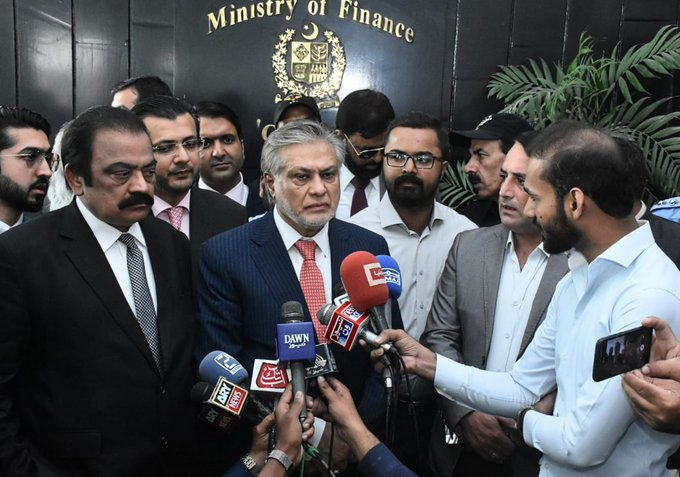
Finance Minister Ishaq Dar said on Wednesday that some changes would be made in the central bank law at “an appropriate time”, advocating intervention in the currency market that signalled a needed shift in the International Monetary Fund (IMF)-backed policies.
In his first media talk after taking oath as the finance minister, Dar said that the exchange rate regime could not be left on speculators, sending a strong message to the people and the banks that had been playing with the value of the local currency for their vested interests.
“Intervention [in the foreign exchange market] for the sake of the country is not bad but obviously the approach should be realistic,” he said.
He added that all the central banks around the world, including the United States and the United Kingdom, intervened in the exchange market, only when the value of their currencies go above or below a certain band.
Dar has hawkish views on the rupee-dollar parity and believes in having a strong rupee value versus the US currency. The Pakistani rupee continued its upward trajectory for the fourth consecutive working day, gaining a fresh Rs1.79 to a new two-week high of Rs232.12 against the US dollar on Wednesday.
However, the new finance minister clarified that he was not against the “market-based exchange rate regime”, insisting that it was the ruling Pakistan Muslim League-Nawaz (PML-N) that implemented the market-based exchange rate regime in 1998.
Pakistan does not have luxury to throw the dollars in the market due to low levels of reserves of $8.6 billion, thus, it is expected that Dar will improve the currency value through administrative steps and containing imports.
Maintaining a true market-based exchange rate regime is one of the four key pillars of the IMF programme. The IMF has pushed Pakistan to adopt this free regime after $24 billion were poured in the market from 2012 to 2019.
According to The Express Tribune exclusive in January 2020, the state Bank of Pakistan (SBP) pumped a whopping $24 billion into the inter-bank market from 2012 to 2019. Official record showed that the money was thrown into the inter-bank market at the time when Pakistan was not in any IMF programmes.
The official record also showed that from July 2012 to July 2013, the central bank pumped $3.43 billion into the inter-bank market. The highest amount of the money injection was from October 2016 to June 2019 – the period when there was no IMF programme in Pakistan.
During this period, the SBP poured $20.7 billion into the inter-bank market. The highest amount that the SBP utilised to defend the rupee in any quarter was $2.2 billion that it pumped between May and June 2018, followed by $1.8 billion from January to March 2018. This was the period when Ishaq Dar was not the finance minister.
From October 2018 to April 2019, the SBP had pumped nearly $4.5 billion into the inter-bank market when the PTI was in power. The Express Tribune reported in September last year that the SBP again threw $1.2 billion in the market from May to September 2021.
Responding to a question about the policy of injecting dollars into the market to keep the rate low, Dar said this was a “massive lie”. “We did not have dollars to inject,” he said, adding that the PML-N government built up foreign reserves of $23 billion. He went on to say that this was “natural progress and growth” and a result of the policies of the PML-N supremo Nawaz Sharif.
“I believe in a market-based economy but no one will be allowed to play games with Pakistan’s currency”, he said.
Responding to another question about an absolute autonomy granted to the SBP by the previous regime under the IMF deal, Dar said that there were few unreasonable clauses in the SBP Act, “which will be amended when there will be an appropriate time”.
During his first visit to the US, the IMF had barred the former finance minister Miftah Ismail from making any changes in the SBP law. All the political parties have serious reservations over some amendments made in the SBP Act under duress from the SBP.
The Monetary and Fiscal Policies Coordination Board (MFPCB) has been abolished, which the PML-N and the PPP wanted to retain. These political parties were also against a complete ban on the government borrowing from the SBP, fearing that it would throw the federal government at the mercy of the commercial banks.
Their fears have proven true during the past eight months.
Through the SBP law amendments, parliament’s oversight of the central bank has been further weakened. The government also wants to have an institutional arrangement instead of setting a liaison between the finance minister and the SBP governor.
Under the law, the SBP Board and its chairman, who is the governor, is also against the best practices, said PML-N MNA Ali Pervaiz Malik. The PML-N also objected to giving the governor powers to appoint deputy governors.
The opposition also suggested amendment to the bill to limit the powers of the board to fix salaries of the governors and deputy governors, saying that the public sector could not have salaries equal to the private sector.
While speaking about rising inflation in the country, Ishaq Dar said that a strong rupee would help contain inflation. “All of you know at which stage was the economy, when the PML-N left the government. Food inflation was 2%, the reserves were at their highest, the rupee was stable at Rs104.50 and Pakistan’s growth was at 6.3%, said the new finance minister.
Dar blamed the PTI government for failing to manage the economy. He added that the PDM government could not reverse the destruction of the approximately four years of the PTI’s tenure in a few months.



1732132039-0/Fortnite-(2)1732132039-0-165x106.webp)
1732130824-0/Simon-(2)1732130824-0-165x106.webp)






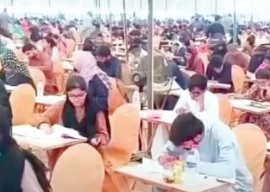
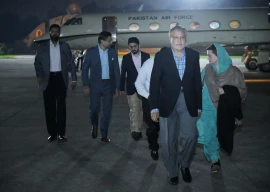
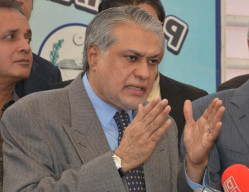
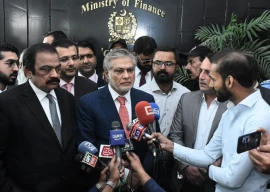






COMMENTS (2)
Comments are moderated and generally will be posted if they are on-topic and not abusive.
For more information, please see our Comments FAQ